Textile district, wool territory, land of looms, capital of wool, these are some of the many ways in which the Biellese is usually defined, a province that over the years has shaped and developed its entrepreneurial identity in the fashion sector. An internationally renowned context of excellence that has been able to reinvent itself, going beyond traditions and mere production. Biella is also a land of creativity and sustainable innovation: in October 2019 it was selected to join the UNESCO Creative Cities Network in the “Crafts & Folk Art” sector and, in addition to the prestige derived by this acknowledgement, extremely relevant is the all-important link between fashion and sustainability. The history of the fashion industry sadly shows that these two macro-worlds have rarely travelled together. One essential fact confirms it: the fashion industry is considered the second most polluting industry in the world. So how can fashion become an example of sustainability? And how can art be the key to identifying useful solutions to achieve the goal that for many could be considered utopian? One of the sparks that led the Biellese to commit to sustainability – and therefore to articulate those key questions – probably originated in 1994, when Michelangelo Pistoletto started acquiring and regenerating the spaces of the former Trombetta wool mill, creating Cittadellarte and, eventually, its Fashion Office. Extremely relevant in this regard is Fashion B.E.S.T., an operational workshop dedicated to the development of sustainability in the textile sector. In this project, Cittadellarte’s creativity activates all the stakeholders in the world of sustainable fashion making them interact at different levels, from design to production, from distribution to communication, gathering onto a platform dozens of companies producing eco-sustainable fabrics, yarns and accessories.
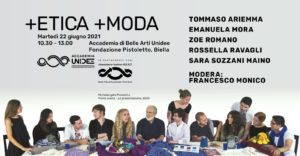
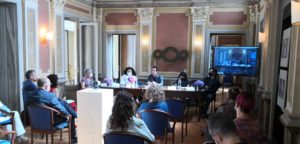
Yesterday, Cittadellarte was once again the active background for two initiatives aimed at urging fashion to focus on ethics. In the morning, the Sale Auliche hosted + Etica + Moda, a conference organised by Accademia Unidee which launched a speculative investigation into the resonance of the fashion system in dealing with the theoretical concepts of sustainability and circularity present in contemporary global culture.
The list of speakers in the panel clearly conveys the authoritativeness of their contributions: Tommaso Ariemma, professor of Aesthetics at Lecce’s Academy of Fine Arts; Emanuela Mora, full professor of Sociology of Communication at the Faculty of Political and Social Sciences of the Catholic University in Milan, director of the Doctoral School in Sociology and director of the Centre for the Study of Fashion and Cultural Production (ModaCult); Zoe Romano, lecturer in social innovation, digital manufacturing, open design; and Sara Sozzani Maino, vice director of Vogue Italia and director of Vogue Talents (we will soon publish video-interviews with the guests). Participating for Cittadellarte were Rossella Ravagli, director of the three-year Higher Education Course in Sustainable Fashion of Accademia Unidee; Paolo Naldini, director of Cittadellarte, who opened the conference; and Francesco Monico, director of Accademia Unidee, who also acted as moderator.
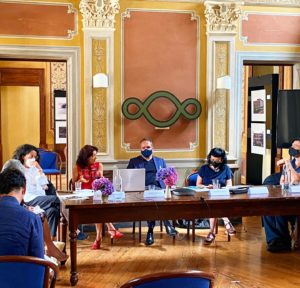
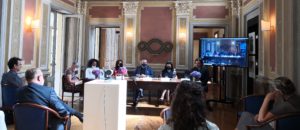
On the basis of what previously reported, in his speech Naldini started by highlighting the reasons that led the foundation of a contemporary artist to deal with fashion, discussing the role played by the Venus of the Rags – an iconic work emblematic of the so-called ‘consumed consumerism’ – and explaining the relationship with Pistoletto’s Progetto Arte, through which the artist expressed the will to put art in relationship with every sector of the social fabric. “It was necessary to work on a project of balance, – said Naldini – where art would be the element of encounter and connection, even in the wool sector, which finds one of its greatest expressions in the Biella area”. The contributions of the speakers, albeit coming from different fields of specialisation, followed the common thread of sustainability, offering inputs of great importance. Parallels were drawn between the Greek myths of Atlantis and Arachne and fashion, Timothy Morton’s dark ecology and dark media were analysed and a new connotation was attributed to the verb ‘to have’: “We must give to have, and not take to have. This is sustainability”– said Ariemma. The debate between the speakers dealt with the relationship between consumers and what’s new, and with the role that correct information would have in engaging social awareness on the issue, despite the fact that in Italy the attention to sustainability is fluctuating. As it emerged, in fact, fashion is ethical when it “acknowledges a non-extraneousness of its materials”. The speakers stressed that what we wear should not be considered our second skin, but actually our first, an extension of us. But the sine qua non for achieving sustainability is that businesses must be oriented not only towards profit, but also towards social responsibility. The conference ended with a Q&A focusing on the relationship between the role of the consumer in the fashion and in the food sector. The connection between speakers was made possible by Accademia Unidee, which, as reported by Francesco Monico, has once again been able to produce culture. And yesterday’s event is a striking example of this.
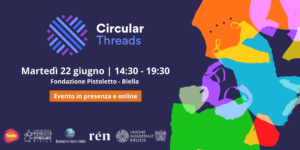
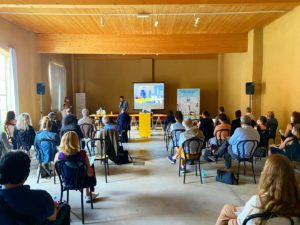
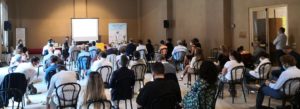
In the afternoon, the Sala Cervo hosted Circular Threads, a conference presenting a study on the role of circular economy in the Italian textile sector curated by Tondo APS, Fondazione Pistoletto, Associazione Tessile e Salute and Rèn Collective and organised in partnership with Biella’s Industrial Union; the event was aimed at promoting the transition to circular economy in the textile industry through an initial measurement of the level of sustainability and circularity of the sector and of the single companies. As reported in our previous article, the study made it possible to evaluate the level of circularity of the sector in Northern Italy. The research, which involved about 300 companies, was conducted on three levels of analysis (desk search, questionnaire, measurement of circularity) and has provided an overview of the current situation in the sector, with the ultimate goal of understanding the existing gaps and accelerating the transition towards a circular economy in the textile industry, also thanks to the identification of best practices and of the main challenges to be faced. The conference saw the participation of national experts and of representatives from local historical wool companies like Successori Reda, Vitale Barberis Canonico and Fratelli Piacenza, who illustrated the sustainability and circularity projects implemented in their businesses, and from new organisations aiming at revolutionising the sector.
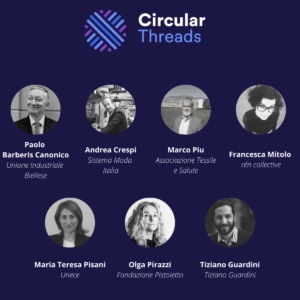
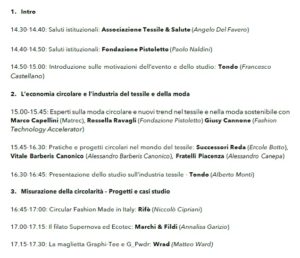

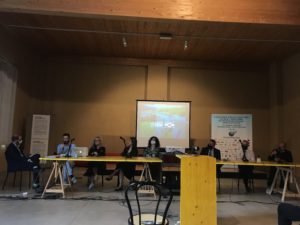
As it had happened in the morning, the afternoon’s debate also raised critical issues revolving around the fashion industry, like, for example, the fact that we consume more than necessary and that there appears to be a big discrepancy, on a global level, between what is produced and what is purchased. Three case studies – the Graphi-Tee developed by Wrad, the Supernova and Ecotec yarn by Marchi & Fildi and the project Circular Fashion Made in Italy by Rifò – were also presented. Not only that: the new trends in sustainability and circularity in the textile and fashion sectors were discussed with a series of guests of national relevance, such as Marco Capellini, Rossella Ravagli, Giusy Cannone and Sara Sozzani Maino. The activities of the day concluded with an important moment of dialogue: a debate about the actions and levers that can facilitate the circular transition in the textile sector, with the participation of Biella’s Industrial Union, Sistema Moda Italia, Associazione Tessile e Salute, Rén, UNECE and Cittadellarte (see the list of contributors in the poster at the beginning of the paragraph). In addition to the presentation of their research work, the speakers illustrated how their reference organisations work to achieve sustainability, often inspired by the United Nations 2030 Agenda. A mosaic of testimonies and documentary evidence has placed Biellese and national best practices in the spotlight, demonstrating that sustainable fashion is not a utopia.

